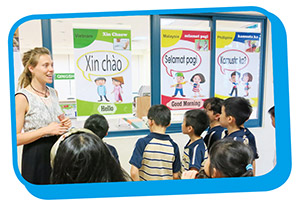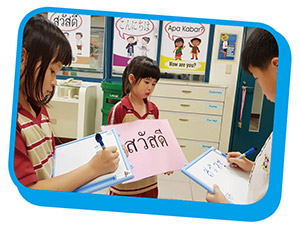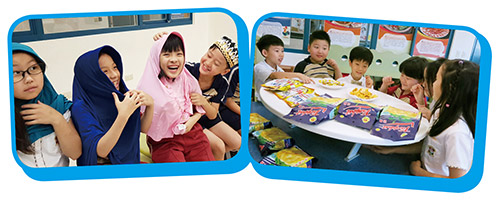
Congratulations on Graduating!
國際處主任 賴國宜
The number of immigrants in Taiwan has surpassed 650,000 and there are about 710,000 workers from foreign countries currently registered. Under the theme, "New Immigrants, New Friends", the International Culture Week will be held in English Village after the final assessment. By experiencing the languages, traditional clothing and foods, we hope our students will become more understanding of cultural diversity and be able to work well with people from different countries.
How long has it been since you read with your kids? I would like to recommend you to read the picture books that our grade 5 students created for younger readers in grades 1 and 2. You will be amazed by their creativity and their ability to incorporate technology into the designs of their digital picture books.
We have had a terrific year. I hope everyone will have a great summer vacation. Our grade 6 graduation ceremony will be held on June 15. Best wishes and congratulations.
根據內政部2019年5月的統計顯示,透過婚姻或其他方式,取得中華民國國籍的台灣新移民人口超過65萬人,占全台人口的3%以上,已超過台灣原住民的人口,成為台灣第二大族群。此外,還有將近71萬的外籍人士在台工作。這群不同膚色、口音、飲食習慣的朋友,就生活在你我身邊,期末考後,國際處以「新移民,新朋友」為主題,在英語村進行國際文化周活動,藉此讓孩子體會外來移民者到新環境適應的艱辛,並認識多元的文化特色。
以圖畫來說故事的繪本,不只小孩喜歡閱讀,大人也喜歡欣賞,尤其是碰到問題無法解決時,圖畫書經常可以提供讀者心靈慰藉。五年級的「童書繪本」專題,外師帶著學生從欣賞繪本的特色著手,經過設定主題、發展故事情節、設計插圖、到最後製作電子書,孩子經歷了一本繪本從無到有的過程,最後還將親手製作的圖畫書呈現給低年級學弟妹,透過製作與分享故事書,我們希望孩子能更深刻的感受閱讀的樂趣與文學之美。
學期又將結束,相信這又是學習豐收的一年,預祝所有康橋家庭都有個愉快充實的暑假,也祝福即將邁入人生另一個旅程的六年級畢業生,展翅高飛,一帆風順。

~ Sheryl Yu
Curriculum Coordinator, International Department
Have you ever noticed immigrants around you? Immigrants have come to Taiwan for a range of reasons, including international marriage or to pursue long-term careers. But no matter what their reasons, they choose this beautiful island, Formosa, to be their second home. They devote themselves to this new place to fulfill their dreams like the locals do. We should recognize their contributions and continue being friendly towards them.

Under the theme “New Immigrants, New Friends”, we designed three stations at the English Village called, New Languages, Traditional Clothing, and Exotic Foods. Our aim is for students to explore the cultural characteristics of other countries, foster international points of view within Taiwan, and discover our common humanity through different ways of living.

New Languages
By studying a world map, students learned where most immigrants come from as well as their population size in Taiwan. They shared experiences they’ve had with immigrants and learned some phrases in the new languages, such as how to say and write “hello”. While having fun learning these new languages, they realized how hard it must be for an immigrant to Taiwan to learn Chinese. After becoming more familiar with the countries, we talked about why immigrants may have left their home countries and how they contribute towards making Taiwan a better place for all.
Traditional Clothing
The clothing fashions of different cultures are eye-catching, and represent a country's history and identity. At this station, students had the chance to appreciate the traditional dress of the immigrants’ nations. They tried on the songkok and hijab that many people in Indonesia wear. They are Islamic religious costumes that Muslims wear. Students learned to respect the differences and why it is important to accept different cultures.

Exotic Foods
Many of us associate different foods with different countries. The smell and taste of home cuisine comforts the hearts of immigrants. At this station, students learned about the geography and local food of the immigrants’ home countries. They tasted some of the exotic local snacks of these countries. The activity aroused the students’ curiosity about the countries and made them realize how weather and location can affect different cultures’ eating habits.
International Culture Week is an essential event for the International Department at the end of each school year. We hope to open the window of the world for our students in order for them to connect with other countries and learn to value diversity. We believe that our future leaders must be able to understand cultural differences to work well together with people from different nations. This is an essential part of the global citizenship aspect of our curriculum!

![]() 全文下載)
全文下載)